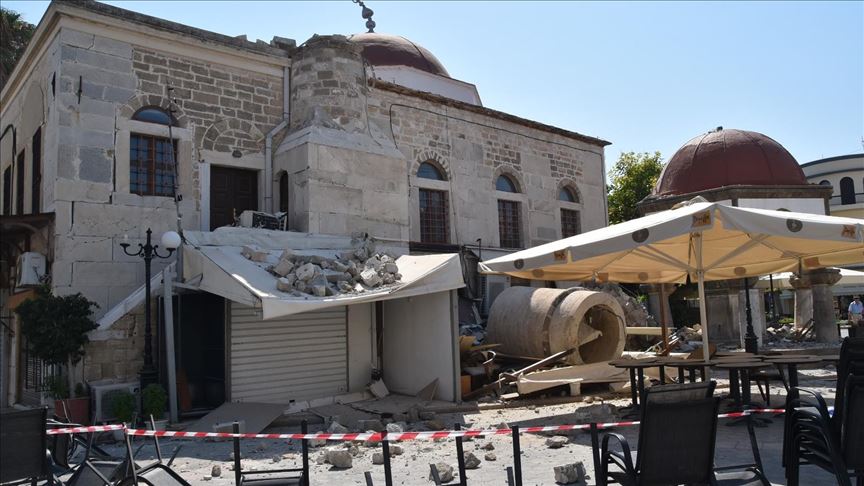
IZMIR, Turkey
There are around 20,000 Ottoman monuments in Greece and the country does not allow Turkey to restore even one of them, an academic said.
Neval Konuk Halacoglu, PhD, from Turkey's Marmara University in Istanbul, said Greece has never allowed Turkey to restore any of the Ottoman monuments in the country.

Greece registered Ottoman monuments as "Muslim monuments," instead of Ottoman or Turkish monuments, which prevents Turkey to have a say over them, Halacoglu told Anadolu Agency at a symposium on the problems of Turkish minority in Dodecanese islands of Greece.
"We [Turkey] cannot restore even a single fountain and I foresee that we will never be allowed," she said.
There are Ottoman monuments in all over the Balkan region, and many of them -- except the ones in Greece -- have been restored by Turkish institutions, mostly by the Turkish Cooperation and Coordination Agency (TIKA).
Among the Ottoman monuments that Greece recognizes as "Muslim monuments," only a few of them were restored by Greece, Halacoglu said.
Greece restores those monuments only if they are in a visible place such as a tourism area, she added.
Ottoman monuments built after 1831 not registered
Ottomans had annexed today's northern Greece and Bulgaria even before the conquest of Istanbul, said Halacoglu.
Greece and Bulgaria have monuments even from very early Ottoman period.

Halacoglu said Greece takes the date of its independence, 1831, as a reference date for registering the Muslim monuments.
"Therefore, Ottoman monuments built after 1831 across Greece are not registered," she stressed.
But after that date, most of Greece was still under the Ottoman rule and the latter lost northern Greece in 1912, Halacoglu said.
Between 1831 and 1912, many public buildings such as schools, government offices, and military barracks were erected by Ottomans in today's Greece, but none of them are registered, she added.
36 Ottoman fountains only around Ataturk's house
Halacoglu said Greece in 2006 prepared an inventory of Muslim monuments in the country.
According to that inventory, there are 8,731 Muslim monuments in Greece, excluding those built after 1831, she said.
"There are around 20,000 Ottoman monuments in Greece," according to Halacoglu.

She said Ottomans had built a lot of fountains and she has discovered 36 fountains only in the area around the house of Ataturk, Turkey's founding leader, in Greece’s second-largest city Thessaloniki.
Some Ottoman monuments are in need of immediate restoration, and Turkey could be allowed at least to take part in restoration process of those monuments, she said.
Today, Hasan Baba Tekke -- a Sufi shrine from 14th century in Larissa, central Greece -- has still been under restoration since 1962, as can be seen in a photo of the shrine in that year, Halacoglu said, showing it as an example of Greeks' approach to the restoration processes.
'If we did similar restoration, whole Europe would be alarmed'
Halacoglu said although Greece restored some Ottoman monuments, it did not remain faithful to the original style of the monuments.
Greece uses colors such as claret red or dark blue, which would never be used in a mosque.

Ali Pasha Mosque in Rhodes Island, the largest of the Dodecanese islands, and a Turkish bath, or hammam in Lesbos Island, were under such restorations, which made them look like night clubs, she said.
This type of restoration destroys the identity of the monuments, she said, and added: "If we restored a monument in Turkey in a similar way, whole Europe would be alarmed".
Greece has a policy of either concealing the Ottoman monuments or restoring them by destroying their identity, Halacoglu stressed.
No single mosque open to worship in Athens or Thessaloniki
Halacoglu said Greece rejects even the help of a Turkish expert in restorations.
The minaret of Suleymaniye mosque in Rhodes Island was restored in 10 years because Greece was unable to find an expert on minarets and they did not look for an expert from Turkey.
"In the last 15 years, we [Turkey] have opened 84 Greek Orthodox churches for worship, which were financed by Turkey," Halacoglu said.

She said that some of these churches were rebuilt almost from scratch.
There is not even one mosque which is open to worship in Athens or Thessaloniki, she added.

City of Rhodes has more Ottoman monuments than some of the Turkish cities such as Edirne, one of the first capitals of Ottomans located in today's northwestern Turkey, she stressed.
Anadolu Agency website contains only a portion of the news stories offered to subscribers in the AA News Broadcasting System (HAS), and in summarized form. Please contact us for subscription options.







